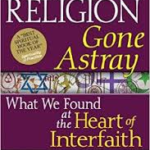The authors reflect on aspects of their traditions that are routinely invoked by many of their coreligionists in order to seek to justify religious exclusivism, communal supremacism, violence and gender injustice.
Religion Gone Astray”What We Found at the Heart of Interfaith
By Pastor Don Mackenzie, Rabbi Ted Falcon and Imam Jamal Rahman
Published by: Skylight Paths, Woodstock, Vermont, USA
Pages: 170
Price: $18.99
By A Staff Writer
US-based Pastor Don Mackenzie, Rabbi Ted Falcon and Imam Jamal Rahman are a team that is engaged in something that is badly needed all across the world today”promoting dialogue, understanding and friendship between people who claim to follow different faiths. This book comes out of the many questions that this team of intimate friends has been asked during their numerous speaking engagements. The trio talk of what they regard as the core teachings of their respective religious traditions (Christianity, Judaism and Islam), and share aspects of these traditions that are aligned with those teachings. Along with this, they also share aspects of their traditions that seem contrary to these teachings, focussing particularly on religious exclusivism and supremacism, violence and gender injustice.
Monopolistic Claims to Truth
Like individuals, religions, when they become institutions, can, as the title of this book says, go ‘astray’, deviating far from their purpose. They do this, the authors say, when, for instance, they are interpreted to promote monopolistic claims to truth, when they are marshaled to foment conflict and engage in violence against people who behave and believe differently and when they are invoked to seek to justify gender injustice. Hence, the authors stress, they ‘need to be called back'”which is what this thoroughly engaging book does a brilliant job in trying to do.
The authors point to the key importance of interfaith dialogue in this process of calling back their faith traditions and their coreligionists who have gone ‘astray’. Through their own close personal friendship, through sharing with one another the problematic aspects of their own traditions and through participating in the spiritual practices of each other’s traditions, they indicate how interfaith dialogue”especially when it takes the form of close friendships”can be of great help in one’s spiritual evolution. Such dialogue can enable people to appreciate and incorporate wisdom and insights from other religious traditions. It can help them seriously reflect, with people of other faiths acting as a mirror, on problematic aspects of their own traditions that they might not otherwise have noticed or might have denied. Through interfaith dialogue, they can benefit from how others are coping with and seeking to overcome problematic issues in their own religious traditions that need rethinking”issues like exclusivism, supremacism, violence and gender injustice in the name of religion, that this book discusses in detail and that people of all faiths have to contend with.
Healing the World
Oneness, the authors say, is a core teaching of Judaism, while it is unconditional love in Christianity and compassion in Islam. These core teachings provide them a standard of measurement to discern aspects of their own traditions that are inconsistent with them. Through this lens, the authors reflect on aspects of their traditions that are routinely invoked by many of their coreligionists in order to seek to justify religious exclusivism, communal supremacism, violence and gender injustice, which the authors say clearly violate what they regard as their faith’s core teachings. They point to the urgent need to promote alternate understandings of these aspects of their religious traditions so that they can play a role in healing the world instead of adding to human misery.
Much of this book is about how the authors seek to articulate an understanding of their own respective faiths that is inclusive, accepting of other faiths and their adherents, and gender just. In the process, they do a brilliant job of critiquing, on religious grounds itself, the arguments of their coreligionists whose interpretations of their religions they believe violate their religions’ core teachings.
This book is definitely a must-read for anyone concerned with promoting interfaith or inter-community harmony.


COMMENTS